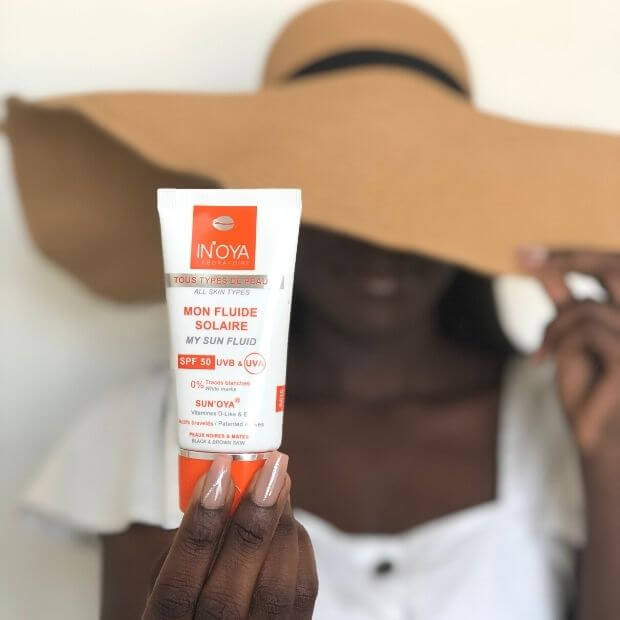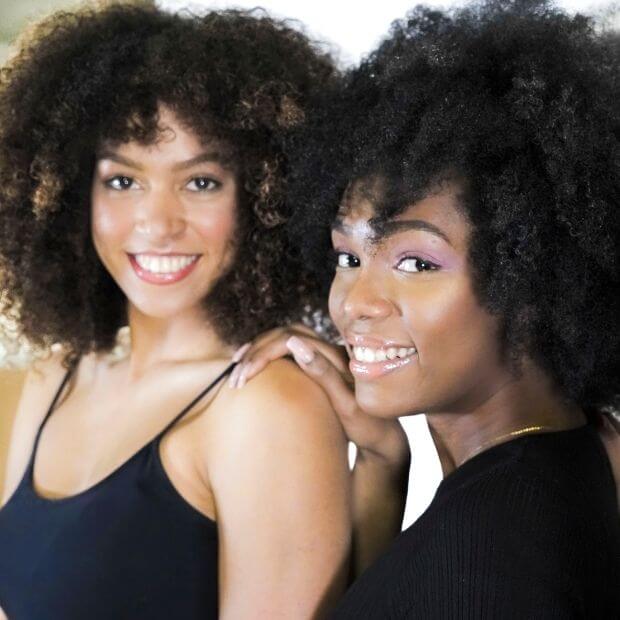Black skin is the subject of multiple beliefs. As an expert on black skin, it was essential for us to enlighten you on these topics. We've brought together the most common misconceptions in order to disentangle the true from the false. 10-point decryption.

1. Sunscreens are useless for black skin
This is the most common misconception. You think, wrongly, that black skin never tans and cannot, under any circumstances, be prone to sunburn. Even if it is actually less vulnerable than white skin to radiation, this is totally false ! The effects are harmful to all skins.
During overexposure, the natural protection of black skin is limited. UV rays are thus responsible for many skin damages : hyperpigmentation spots, areas of flaking or real sunburn.
To protect yourself against these very real risks, it is therefore strongly recommended to apply a sun care adapted to the characteristics of black skin.

2. When you have black skin, you don't need anti-aging care
In fact, black skin has the ability to age more slowly than white skin. Because of this, the biological age of the skin seems lower than the age of the person. Its structure simply allows it to be better protected against ultraviolet rays on the surface. Thus, their effect on skin aging is more moderate.
The fibroblast of black skin is very effective, it ensures elasticity, firmness and suppleness. But this decisive advantage only slows down the appearance of the signs of aging : it does not remove it. This support cell can therefore be boosted with an anti-aging treatment, in order to obtain an even firmer, supple and radiant skin!
3. Black skin is thicker and stronger
Black skin is actually not thicker, but denser: 3 times more than Caucasian skin. Its dermis is richer in collagen and elastin fibers. More compact because its epidermis has 12 strata against 8 for other skin tones. Therefore, cell renewal is 2.5 times slower for black skin.
It is therefore essential to support this stage of regeneration with targeted active ingredients. And for cases of cut or injury, the healing being longer, increased vigilance will be recommended to avoid infections.
4. All cosmetics are suitable for black skin
Cosmetic products are primarily designed to meet specific requirements. It is therefore essential to identify the nature and type of skin to benefit from a personalized care protocol. Unfortunately, due to ignorance or lack of appropriate advice, the choice of an inappropriate care is common in people with black skin. With sometimes multiple needs such as oily skin, but sensitive and dehydrated, you can, indeed, feel lost in front of a ray of cleansers and face creams or body milks!
The advantage of using products designed for black skin is to benefit from real expertise. In'oya has also developed online diagnostics, and it was crucial for its founders to be able to meet this essential need with an easily accessible service.

5. Scrub on black skin should be vigorous to ensure radiance
Under the pretext that black skin is " thicker" (see above !), the facial or body scrub should be stronger. The goal would be to remove a larger number of dead cells. In reality, this gesture is simply not recommended.
Indeed, too energetic, too frequent, exfoliation will literally irritate often sensitive black skin. The epidermis may overreact in the face of what it will consider aggression. In response, drying out following friction can also lead to excess sebum.
On the other hand, performing a very gentle scrub once or twice a week has a proven beneficial effect. It improves skin regeneration by naturally and without forcing dead skin.
6. Black skin is always combination or oily with pimples
The majority of black and matte women have combination to oily skin on their face. Their number is estimated at about 65%. A set of factors explains this observation: natural dehydration or due to external aggressions: climate, stress, pollution, hard water, etc. The skin tissue then protects itself by producing excess sebum.
However, as you can see, 35% of black women have a different skin nature! It is also possible to see your skin type change with the change of season, environment or even as you get older. Combination skin in summer can, for example, become normal to dry in the middle of winter !
7. Fashion & makeup : some colors are not recommended for black skin
As for the colors of clothes, make-up, everyone, regardless of their complexion, is housed in the same brand ! Indeed, to know the shades that highlight you, it is enough to detect your subtone by referring to the chromatic circle. This accessory, used by fashion and makeup professionals, is very easy to handle.
With a simple test, you will identify your profile. Thus, some of you will be enhanced by warm tones, while others will discover the cool colors reveal their beauty in a blatant way. The lucky ones will be offered a whole range of tones to vary their style to infinity.

8. The smell of black skin is peculiar
This is a false belief. Body odor is unique to everyone. It depends more on an individual factor than on a skin color factor. Indeed, in reality sweat has no smell. It is the bacteria present on the skin that by feeding on sweat, release substances that they are odorous.
The skin flora is unique to each individual, which is why we each have a different body odor. It can also be influenced by our skin type, our environment or our cosmetic habits.
9. Black skin has less hair (so less trouble waxing or shaving)
This belief is to be relativized on several points. Moderate hairiness is usually noticed on black skin of sub-Saharan origin, and further north, towards the Mediterranean, it is often more pronounced. However, genetic factors or miscegenation potentially vary this phenomenon, especially in the face.
Generally, with more or less hair, hair removal and shaving of black skin remain complicated to manage. There are frequent problems with regrowth. Facial hair is regularly ingrown. They tend to curve and curl up on themselves under the skin. They form pimples, cysts or even infections. Ingrown hairs are also the cause of scar spots.

10. Black skin can be bleached with lightening products
Whitening the skin to conform to an image, an aesthetic ideal is a sad reality, often unconfessed. There are really depigmenting products to lighten the epidermis. However, while their promise may seem attractive to candidates for brilliance, they are unfortunately very harmful to health. Among the most dangerous are hydroquinone and corticosteroids. Their presence in some cosmetics presented as miraculous is sometimes even hidden from users.
The risks of these substances on the skin tissue potentially numerous: non-uniform depigmentation, yellowish tint , acne pimples, stretch marks, spots, facial hair, eye problems, etc. Under certain conditions, premature deaths have been observed as a result of applications of depigmenting products.
Concretely , black skin cannot be bleached. However, it is possible to sublimate, unify and reveal its natural radiance with safe and reliable cosmetics, meeting the regulations in force.


